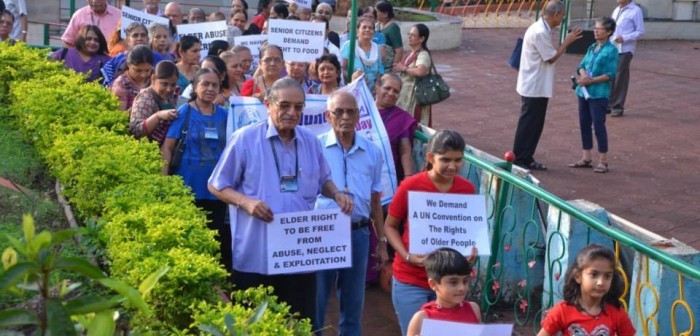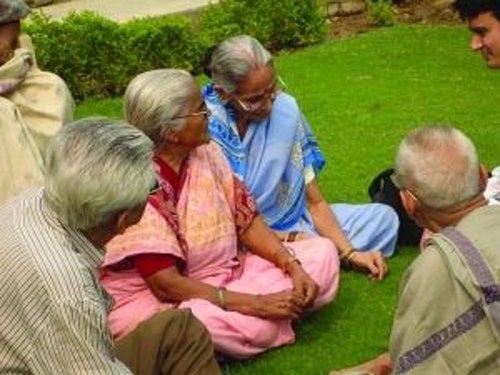With life expectancy increasing steadily, more and more people are living longer. And with this has come a number of new risks and challenges. Being harassed by their children for their deposits and property; Their signatures being faked to take loans against the properties. Children refusing to take elderly parents to the doctor for treatment; not getting their food or medication on time; rude language and behaviour; threats to throw them out on the streets if they complain.
These are some of the types of elder abuse, say those working to prevent it. Given our cultural conditioning, it is expected that children, especially the sons, would take care of parents in their old age. However, surveys and workshops by organisations working with elders like HelpAge India, Nightingale’s Medical Trust (NMT), Bangalore show several instances of elder abuse where the immediate family is the main perpetrator. ‘The sons, along with the daughters-in-law are increasingly turning abusers. Surprisingly there is an emerging trend of the daughters also turning abusive,’ says a 2014 study, Elder Abuse in India.
Elder abuse can be prevented or at least reported with a little awareness, which, sadly enough, is yet to come.

A walkathon in Mumbai to spread awareness about elder abuse. Pic: Silver Innings Foundation
Senior citizens in the country can avoid ill-treatment or abuse at the hands of their family under the Maintenance and Welfare of Parents and Senior Citizens Act 2007. This law aims to prevent elder abuse by making it a legal obligation of children to provide maintenance to their parents. Under the Act, parents and grandparents who are unable to maintain themselves from their own incomes can demand maintenance from their children. The Act also provides for ‘Childless Senior Citizens,’ who are unable to maintain themselves from their own income and can demand maintenance from their relatives. Maintenance in this case includes provision for food, clothing, residence, medical attendance and treatment.
Unfortunately, awareness of the Act is extremely low among senior citizens in India, according to a survey done by HelpAge India in 2014. One in five elders is unaware of any available redressal mechanisms. Their awareness of the existence and the provisions of the Maintenance Act is very low; only 14 % of abuse victims even know the law exists.
What is abuse?
The World Health Organization defines elder abuse as "a single, or repeated act, or lack of appropriate action, occurring within any relationship where there is an expectation of trust which causes harm or distress to an older person.” According to WHO, elder abuse can take various forms such as physical, psychological or emotional, sexual and financial abuse. It can also be the result of intentional or unintentional neglect.
As the Helpage survey states, most elderly associate elder abuse with disrespect, verbal abuse and neglect. Verbal abuse ranked the highest in the survey, followed by neglect and disrespect. The HelpAge 2014 survey also showed that 50% of seniors experience abuse. Of the top metros, Delhi had the lowest percentage of abuse (22%) and Bangalore had the highest (75%) of elder abuse.
Most cities across India have helplines run by the police to help elders, often in association with eldercare NGOs. However, while many are aware of these Police Helplines, very few people approach them, fearing social stigma and isolation. According to the HelpAge 2014 survey, fear of retaliation is a major factor in not reporting abuse, especially among seniors in Tier II cities like Nagpur.
Those who work with elder helplines are not surprised. “Seniors safeguard their children even if ill-treated by them,” says Sandhya, a counselor at the NMT Elders Helpline in Bangalore. Established in 2002, the helpline is a joint initiative of the Bangalore City Police and the NMT to address elder abuse. It’s located at the Police Commissioner’s Office premises on Infantry Road and also offers free legal advice and counseling through alternative dispute redressal methods to senior citizens every Thursday and Saturday.
Staying Aware
The simple fact that many elders safeguard their children often leads to lesser cases being reported or resolved. Many elders feel it is their fate that they are being harassed by their own children and would rather tolerate it painfully than bring them to book. According to data available with the NMT Elder’s Helpline (upto 2014), they had received 7500 complaints and had resolved 3500. On an average the helpline receives 30-35 written complaints a month from senior citizens. Of these more than 20 cases are related to harassment by the family, mostly either the son or daughter-in-law. The Helpline has seen an increase in complaints over the years and feels that awareness about mechanisms such as these could help seniors in distress. They have been conducting workshops and talks at apartment complexes and retired employee associations to spread awareness about the Elders Helpline.

There is a need to spread awareness about the Act as well as the Helpline esp. amongst the elders. (Pic: India Together Files)
Sandhya feels elders need to step out of social shackles and report abuse. “We get 60-70 calls related to abuse each day, out of which only one or two are converted into complaints ensuing in legal action. We cannot take action unless they give a written complaint and most senior citizens don’t want to give a written complaint against their own children.”
The other factor that leads to elders being easy targets for abuse is isolation. Many elders stay alone, with children away in other cities, and are easy targets. One of the cases received by the Elders Helpline was of a couple who rented out a portion of their house to a tenant from their own community, thinking the cultural similarity would make it convenient. Unfortunately, the tenant not only refused to vacate the house but also verbally abused the elderly couple, who approached the Helpline for intervention.
There are also cases where the elderly have been forced by their children to gift away the property to their children. Under the Maintenance Act, the tribunals give the option to challenge the gift deed if the elder was forced or was not of sound mind but the process remains a laborious and difficult one, says a counsellor who often comes across such cases in her work with the Elders Helpline.
Most people seem to be aware that elder abuse exists, though few are willing to do anything about it. The HelpAge Survey conducted this year, focused on the younger generation and their perception and awareness of elder abuse. Seventy three per cent of Indian youth (25-45 years) admitted that elder abuse existed. Shockingly enough, most of them were unwilling to do anything about it. In Delhi, 92 per cent of youth were not willing to act when they came across an instance of abuse.
“What is surprising is that the youth of today are aware of the problem, they understand the reasons which precipitate abuse. They have clear solutions on how to avert abuse, but yet seem unwilling to act. Take the case of Delhi, where 85 per cent of the youth admit elder abuse exists yet 92 per cent say that they won’t act to prevent it,” says Manjira Khurana, Country Head, Advocacy & Communications, HelpAge India.
Measures to prevent abuse
Awareness of the Maintenance and Welfare of Parents and Senior Citizens Act 2007 is paramount. Many people also think that living in large joint families can help prevent abuse.
Why are cases of abuse on the rise? According to those who work in the area, increased life spans of the population and a change in traditional family values have led to cases of abuse, exploitation and desertion of older persons. Elders suffer physical, emotional, and financial abuse in silence as ill-treatment and abuse occurs mostly within the family.
Gerontologist Dr Indira Jai Prakash says that elder abuse is still a hidden problem and both victims and people who would like to help victims find it difficult to define it adequately. While legal sanctions are necessary, there is also need to sensitize people about this issue. It is also vital to have a bottoms up approach so that people who are the main target or are potential targets are made aware of how to identify, prevent and protect oneself from such situation. Community can play a very important role in both preventing the abuse as well as empowering the elders to fight back against such violation of their basic human rights.
The NMT Elders Helpline team visits groups of seniors every month. Recently, they conducted a workshop with a retired employee association where they found 10 cases of elder abuse. Sadly, none of the senior citizens, all of them ex-employees of a reputed PSU (public sector undertaking) had any idea of the 2007 Act.
How does the Act help
Seniors can apply to a maintenance tribunal under Section 4 giving names, full details and addresses of the persons from whom they are demanding maintenance. If the senior citizen is incapable of making an application on their own, any other person or registered voluntary organization authorised by him/her can make the application. Upon receipt of the application, the maintenance tribunal would issue notices to the children, conduct hearings, take evidence and order maintenance. Maintenance tribunal may also refer the case for reconciliation or pass interim orders for maintenance.
Helplines Across India (Run by Dignity Foundation, HelpAge India, Nightingales Medical Trust and other NGOs in association with the city police)
Ahmedabad:1800-180-1253
Gujarat Police Helpline 1096
Bangalore:1090 (Banglore City Police & Nightingale Medical Trust)
Dignity Foundation: 080 4151 1307/4166 1122, 1076
Chandigarh Senior Citizen Helpline 1090
Chennai Senior Citizen Helpline 1253
Helpage India:044 2621 3908, 3850
TN Senior Citizens’ Association: 044 4213 3002
Delhi Dada Dadi Help Foundation: 9212717171 | 9212050505 | 26260777
Delhi Senior Citizen Helpline : 1291
Delhi Police: 1091
Delhi Police Senior Citizens Cell: 011-23490010/ 4336
Hyderabad Senior Citizen Helpline: 0901 047 0724
Indore Senior Citizen Helpline 0731 251 0308, 252 2111
Kolkata Senior Citizen Helpline 98300 88884
Pranam: 033 2419 0740
Mumbai Senior Citizen Helpline 1298/1090
Dignity Foundation Helpline: 022- 61381111
Nagpur Silvers club helpline: 91 9371276575, 9503439201
Pune Senior Citizen Helpline: 1091/020 – 30439100
























